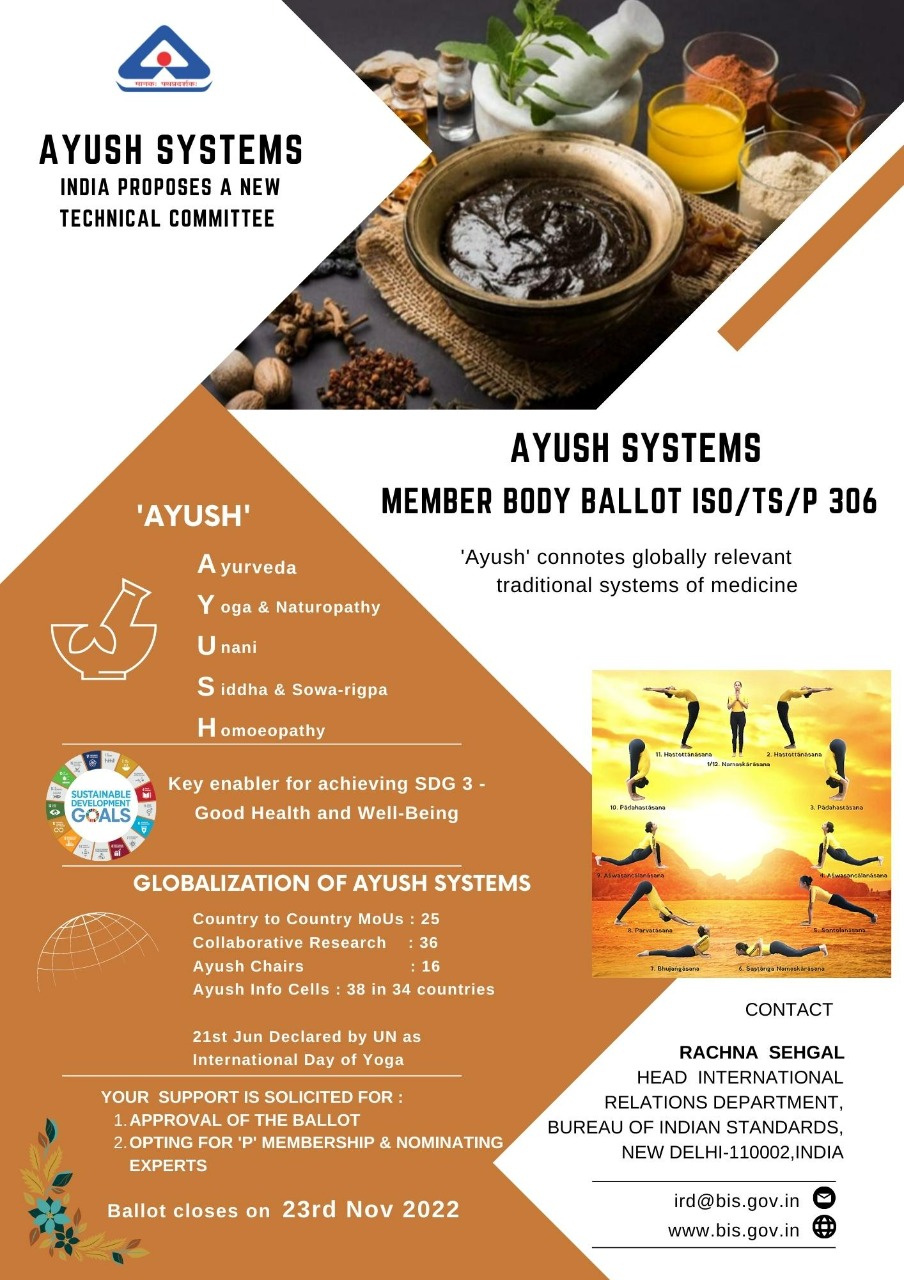

Introduction:
‘Ayush’ connotes the traditional Indian systems of medicine comprising of Ayurveda, Yoga & Naturopathy, Unani, Siddha, Sowa-rigpa and Homoeopathy.
Ayurveda –‘the science of life’ is one of the oldest medical systems which integrally incorporates the concepts of health and disease and aims at achieving homeostasis of the body, mind, and spirit- referred to as the holistic approach. The objectives of Ayurveda are – to maintain the health of the healthy; and to treat the ailing mankind.
Yoga is an art and science for healthy living that brings harmony in all walks of life and thus, is known for disease prevention, health promotion and management of many lifestyle related disorders. The practice of Yoga leads to the union of an individual consciousness with the universal consciousness.
Global landscape:
Globally, the landscape for Traditional & Complementary Medicine (T&CM) has been improving and augmenting consistently. Traditional medical systems including Ayush systems are important and often underestimated health resource with many applications, especially in the prevention and management of lifestyle-related chronic diseases, and in meeting the health needs of ageing populations.
As per a survey conducted by the World Health Organization (WHO) as many as 80% of the world’s people depend on traditional medicine for their primary health care needs; 110 member states reported the use of herbal medicine; 90 WHO member states use Ayurveda; 100 use Homoeopathy; and more than 82 use Unani system of medicine. Given the unique health challenges of the 21st century, interest in Ayush Systems is undergoing a revival.
Ayurveda is recognized in Nepal, Sri Lanka, Pakistan, Bangladesh, UAE, Oman, Saudi Arabia, Bahrain, Malaysia, Mauritius, Hungary, Serbia, Tanzania, Switzerland, Cuba & Brazil. Romania, Hungary, Latvia, Serbia and Slovenia are 05 countries of European Union (EU), where Ayurvedic Practices is regulated. Unani is recognized in Bangladesh, Sri Lanka, Malaysia, Pakistan, Bahrain, UAE & Tanzania. Siddha is practiced in India, Sri Lanka, Malaysia & Singapore. Sowa rigpa is officially integrated into the National health care system of India, China, Mongolia, & Bhutan apart from being practiced in Nepal, Russia, Poland & Austria. Homoeopathy is recognized in Sri Lanka, Bangladesh, Pakistan, Oman, UAE, Russia & Tanzania. It is well regulated in Ghana, Chile, Colombia, Romania, Turkey, Ontario (Canada) & is integrated into National Health Policy in UK.
Global recognition of Ayush systems:
Several countries across the world have entered into MoUs with the Ministry of Ayush, Government of India for carrying out collaborative research on Ayush systems. To have an access to authentic information regarding Ayush systems, many countries have set up Ayush Chair in their reputed Universities. Students and researchers from across the globe come to study Ayush systems in India and avail the scholarships/ fellowships made available by the Government of India.
The global interest in Ayush systems is evident by virtue of these systems being discussed across several multi-lateral International Forums including BRICS, IBSA, ASEAN, CICA, BIMSTEC, SCO, etc
IDY–
Recognising that “Yoga provides a holistic approach to health and well-being”, on 11th Dec 2014, the UN General Assembly adopted a resolution declaring June 21 as ‘International Day of Yoga’. The resolution had 175 nations joining as co-sponsors, the highest number ever for any General Assembly resolution. The International Day of Yoga (IDY) is now celebrated in 192 UN member countries.
GCTM–
The first ever UN Global outpost in any developing country, the WHO Global Centre for Traditional Medicine (WHO GCTM) is coming up in Gujarat, India. During the ground-breaking ceremony of the GCTM on 19 April 2022, in the presence of Shri Narendra Modi, Hon’ble Prime Minister of India, Dr. Tedros Ghebreyesus, Director-General, World Health Organization (WHO) termed the centre as a truly global project. The New Centre will focus on data, innovation and sustainability and will optimize the use of traditional medicine.
Universal Health Coverage – SDG 3:
Sustainable Development Goal 3 (SDG 3) aims at ensuring healthy lives and promoting well-being for all at all ages– by achieving universal health coverage (UHC), addressing health emergencies and promoting healthier populations. Traditional and complementary medicine (T&CM) including Ayush Systems can make a significant contribution in achieving the goal.
Need for ISO standards in Ayush systems:
Ayush products are being traded into more than 100 countries either as Medicine or as Food Supplement. With a view to promote the safety, quality and effectiveness of Ayush systems, it is envisaged to formulate International Standards. Such an endeavour is poised to not only augment the International trade but also building confidence among the consumers.
Bureau of Indian Standards (BIS), the National Standards Body of India, has submitted a proposal to ISO for the establishment of a new ISO Technical Committee on ‘Ayush Systems’ with the following scope:
‘Standardization in the field of Ayush systems including Ayurveda, Yoga, Naturopathy, Unani, Siddha, Sowa rigpa and Homoeopathy. Both traditional and modern aspects of products and services of these systems are covered’. Excluded from its scope are products and services covered by ISO/TC 54 ‘Essential oils’, ISO/TC 215 Health Informatics, and ISO/TC 249 ‘Traditional Chinese Medicine’.
ISO has launched a 12-week member body vote for member body consultation with reference number ISO/ TS/ P 306 on 31st August 2022. The ballot will be open until 23rd Nov 2022.
For more details, please click here
Contact Details
Ms. Rachna Sehgal
Head, International Relations, BIS
Email: ird@bis.gov.in
Dr. Pradeep Dua
Deputy Director, MHD, BIS
Email: mhd@bis.gov.in